Unit 3 Teenagers should be allowed to choose their own clothes第三节课
Unit 3 Teenagers should be allowed to choose their own clothes
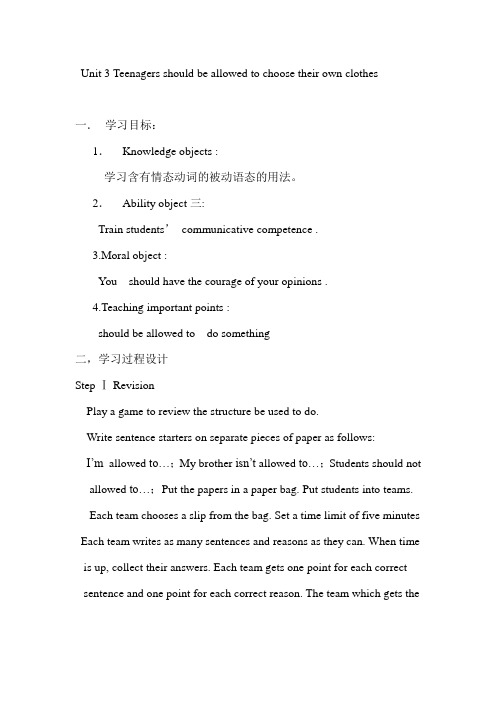
Unit 3 Teenagers should be allowed to choose their own clothes一.学习目标:1.Knowledge objects :学习含有情态动词的被动语态的用法。
2.Ability object三:Train students’communicative competence .3.Moral object :Y ou should have the courage of your opinions .4.Teaching important points :should be allowed to do something二,学习过程设计Step Ⅰ RevisionPlay a game to review the structure be used to do.Write sentence starters on separate pieces of paper as follows:I’m allowed to…;My brother isn’t allowed to…;Students should not allowed to…;Put the papers in a paper bag. Put students into teams. Each team chooses a slip from the bag. Set a time limit of five minutes Each team writes as many sentences and reasons as they can. When time is up, collect their answers. Each team gets one point for each correct sentence and one point for each correct reason. The team which gets themost points wins the game.Step Ⅱ 2aThis activity provides practice understanding the target language inspoken conversation.Point to the picture and ask students what is happening. Elicit answers from students.T: What’s the boy doing?Ss: He is working .T: What are the girls doing?Ss: They are talking.Point to the statements in the chart. Have students look them through. Answer any questions students raise to make sure they comprehend each sentence.Point to the lists of responses. Say, Y ou are to hear Kathy and Molly having a conversation. Kathy will make some statements. Listen and che ck what Kathy thinks and circle Agrees,Disgrees or Doesn’t knowto show what Molly thinks. Point out the sample answers,Play the recording for the first time. Students only listen.Play the recording again. This time students listen and check what Kathythinks and circle if Molly Agrees, Disagrees or Doesn’t know.Check the answers.AnswersThe following sentences should be checked:1,2,3,4,5Molly 1. Disagrees 2. Agrees3. Doesn’t know4. Disagrees5. Doesn’t knowStep Ⅲ 2bThis activity provides practice in understanding the target language in spoken conversation.Point to the list of reasons in the box. Invite a student to read themto the class. Say, Y ou are to hear the same conversation again. This tim e number their reasons in the correct order as you hear on the recording. Point out the sample answers.Play the recording again. Students listen and number the reasons.Check the answers.AnswersThe correct order should be:4,1,5,2,3Step Ⅳ 2cThis activity provides oral practice using the target language.Read the instructions to the class. Ask students for suggestions thatteenagers should and should not be allowed to do.Remind them to look back at Activities 1a and 2a. For example, students might say,Teenagers should be allowed to make their own decisions. Teenagers aboveseventeen should be allowed to join the army. Teenagers shouldn’t be allowed to stay up…point to the sample conversation. Invite a pair of students to say it to the class,completing the sentences.SA: Do you think teenagers should be allowed to work part-time?SB: Yes, I think they should learn to be independence.Ask another pair to demonstrate a new conversation.SA: Do you think teenagers should be allowed to drive?SB: No, I don’t think they are old enough to drive.Have students work in pairs. Move around the room listening in on variouspairs and offering any help they may need.Check the answers by asking different pairs to say their conversations to the class. Note: Answers will vary.Step Ⅴ Grammar FocusAsk different pairs of students to say the statements and questions. Writethem on the blackboard. Check how well students understand each sentence by asking a student to repeat it in his/her own words. Point out I disagree, I agree and Do you think …? If necessary, give students more practice.Grammar noteDon’t explain the structure “be allowed to” to students. It’s toocomplex for students to understand at this point. So it can be studied almost as if it were a vocabulary item at this level.Step Ⅵ Summary and HomeworkIn this class, we’ve done a lot of listening and speaking practiceusing the target language. And we’ve also talk about agreement anddisagreement. Review the grammar box to get a further understanding of the target language .四,教学过程与方法:评价学生是否能积极参与到课堂教学中来,能否积极地回答问题,参与小组协作,能否掌握学习的内容,情感态度与价值观,有学习的渴望,有创新精神和实践能力。
Unit_3_Teenagers_should_be_allowed_to_choose_their_own_clothes
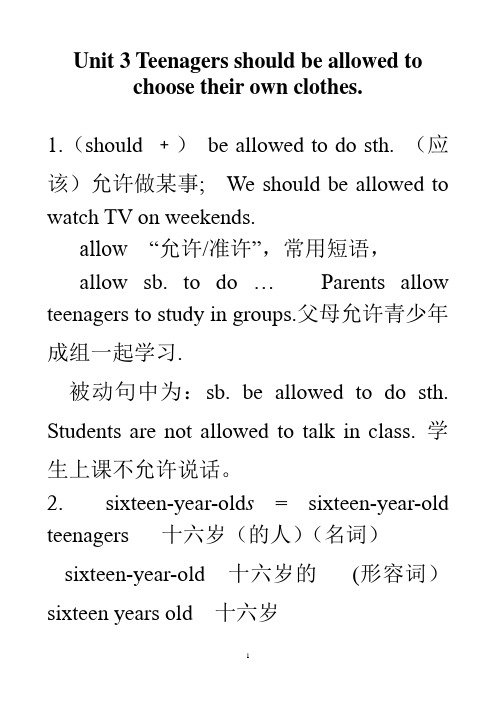
Unit 3 Teenagers should be allowed tochoose their own clothes.1.(should ﹢)be allowed to do sth. (应该)允许做某事; We should be allowed to watch TV on weekends.allow “允许/准许”,常用短语,allow sb. to do …Parents allow teenagers to study in groups.父母允许青少年成组一起学习.被动句中为:sb. be allowed to do sth. Students are not allowed to talk in class. 学生上课不允许说话。
2. sixteen-year-old s= sixteen-year-old teenagers 十六岁(的人)(名词)sixteen-year-old十六岁的(形容词)sixteen years old 十六岁The boy is five years old. = He is a five-year-old boy.3.o wn pron. & adj. 自己的I have my own bedroom.v. 拥有,占有This book is mine. I own it.owner n. 物主,主人Who is the owner of the house.4.(足)够…… enough +名词enough people/water/time/money形容词/副词+enough big/tall/serious enough5. stop to do…停下来去干……He stops to have a rest.stop doing… 停止(不准)干……Please stop talking.stop sb. from doing sth. 阻止某人做某事5. He doesn‟t seem to have many friends.= It seems that he doesn‟t have manyfriends. 他看起来没有很多朋友.6. He needs time to do homework. 他需要时间做作业. need (sth.) to do sth. They need money to buy food.need sth. We all need air and water.sth.doing sth. The bike needs repairing. = The bike needs to be repaired. (主动表被动)7. They talk instead of doing homework. = They don‟t do homework. They talk. 他们谈话,没有做作业.instead of +名词/代词They go to the movies instead of their parents.+动名词(doing) He sang a song instead of telling a story.8. a lot of =lots of 许(很)多/大量的(可/不可数名词)many(可数名词)much (不可数名词)9. So do we. 我们家也是(有). He runs so fast. So does his brother.1) 用副词too 多用于口语,句末, 肯定句/问句.either多用于口语,句末, 否定句表“……也一样”also 多用正式文体, 句中近动词, 各句型.2)用倒装陈述部分肯定用“so+谓动+ 主语”陈述部分否定用“nor/neither+谓动+主语”注意:so+主语+助动词/情态动词/系动词be”,表示赞同某人的看法,意为“是啊,确实如此”--- Lily sings well. --- So she does. ---Lily唱得好。
九年级英语全册《Unit 3 Teenagers should be allowed to choo
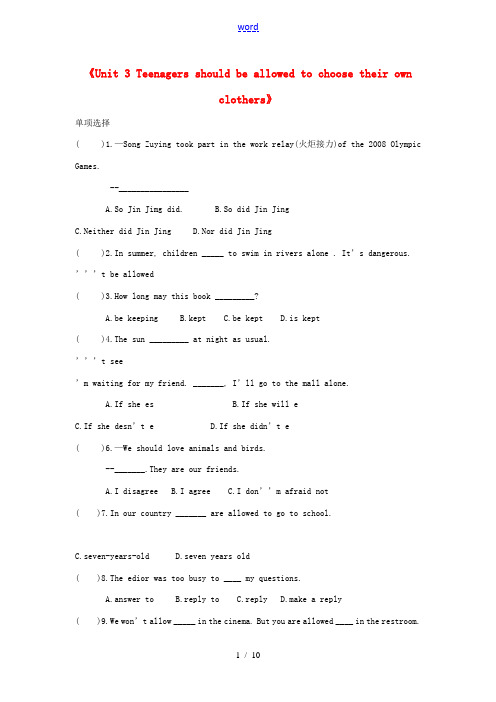
《Unit 3 Teenagers should be allowed to choose their ownclothers》单项选择( )1.—Song Zuying took part in the work relay(火炬接力)of the 2008 Olympic Games.--________________A.So Jin Jimg did.B.So did Jin JingC.Neither did Jin JingD.Nor did Jin Jing( )2.In summer, children _____ to swim in rivers alone . It’s dangerous. ’’’t be allowed( )3.How long may this book _________?A.be keepingB.keptC.be keptD.is kept( )4.The sun _________ at night as usual.’’’t see’m waiting for my friend. _______, I’ll go to the mall alone.A.If she esB.If she will eC.If she desn’t eD.If she didn’t e( )6.—We should love animals and birds.--_______.They are our friends.A.I disagreeB.I agreeC.I don’’m afraid not( )7.In our country _______ are allowed to go to school.C.seven-years-oldD.seven years old( )8.The edior was too busy to ____ my questions.A.answer toB.reply toC.replyD.make a reply( )9.We won’t allow _____ in the cinema. But you are allowed ____ in the restroom.A.smoke; smokingB.to smoke ; to smokeC.smoking; to smokeD.to smoke; smoking’t _____ too late, or you’ll feel tired in tomorrow’s classes.A.wake upB.stay upC.get upD.give up( )11.—I used to go out for a walk after supper.--_______________.A.So do IB.So did IC.So can ID.So am I.( )12.—What should we do first if we want to develop our village ?--A lot of new roads_____, I think.A.have to buildB.must buildC.must be builtD.have built( )13.I must get my breakfast ______ now.’t worry . He is _____ to look after little Betty.A.carefully enoughB.enough carefulC.careful enoughD.enough carefully( )15.What did you use to do ______ my age ?A.atB.inC.withD.to二.完形填空After the Second World War, there were many reports of mysterious(神秘的)“flying saucers(碟子)”.They 1 throughout the world.For quite a long time strange shapes had been reported in 2 parts of the world,but it was not until recent times that these were seriously studied . Pictures and films 3 of flying saucers, or UFOs seen in the sky . Some pilots of 4 reported that round flying machines had flollowd 5 , and moved at great speeds. Some unofficial (非官方的)experts and 6 suggested that some creatures(生物)from other planets were watching us. Some reports said a UFO had 7 the earth. A space creature 8 the UFO and moved around , then flew of again. But none of the landings was ever proved(被证实) to be true.What lies ahead of us (我们的前景如何)?We do not know. 9 we can be sure that whatever happens, we are living in an age which will grow streadily(稳定地) 10 .( )3.A.take B.took C.were taking D.were taken( )4.A.planes( )7.A.was B.left C.arrived nded on( )9.A.And B.But C.Or D.So( )10.A.interesting B.interested C.more interesting D.more interested 三.阅读理解A:Who Influences Teenagers?“Teenager” means people from 13 to 19 years old. Although they’re young, they have to make many important choices by themselves. They need to think about questions like these.Should I go to college ? What kind of jobs do I want ? However, other people also influence their choices . Who influences Teenagers ? Teenagers were asked this question and here’s what they said.It depends on the kind of choice . When teenagers buy things , friends are the most important influence. This is especially true for clothes and music. TV shows, advertiserments(广告)and parents also influence teenagers. In more serious things, parents are probably the most important influence. Some teenagers say it’s best to regard both parents and friends as influences. James, a seventeen-year-old boy says he’s “Just a crazy man”. He also says , “Parents are really important because they can tell you what’s right and wrong.”But teenagers also feel they need to make choices to make their own mistakes.As one teenage girl said, “If our parents don’t let us make our own choices, maybe in the future we won’t know how to do it .” And they feel friends can often be a big help, especially because friends sometimes know more about their situation(处境)than their parents do.Do you depend parents or others when you decide what to do and how to do it ? whoever(无论谁)you depend on ,the correct choice is the most important. Your future is in your hand.根据短文内容,判断正(T)误(F)( )1.When teenagers buy clothes and music, friends are the most important influence.( )2.People from 13 to 19 can be called “teenagers”.( ) shows and advertisements can’t influence teenagers.( )4.Sometimes friends know more about teenagers’situation than their parents.( )5.In more serious things , friends are probably the most important influence. BA DiscussionHost: Hello! I’m Gavin from All Talk 970FM.Wele to our program. Today our topic is part-time jobs. Are they good for school children or not?Headmaster(校长):Certainly not. Children have got two full-time jobs already: growing up and going to school. Part-time jobs make them so tired that they fall asleep in class.Mrs Smith: I agree. I know school hours are short, but there’s homework too. And children need a lot of stay at school until they’re eighteen or nineteen. A part-time job can’t harm(伤害)them. In fact, it’s good for them. They themselves make their pocket money . And they see something of the world outside school.Business man:You’re quite right. Boys learn a lot from a part-time job.And wemustn’t forget that some families need the extra(额外的)money. If the students don’t take part-time jobs , they can’t stay at school.Host: Well, we have got two for , and two agaist . What do our listeners think ? ( )1.How many guests join the discussion ?( )2.Who have the same idea ?A.Mr and Mrs Smith .B.The host and Mrs Smith.C.the headmaster and businessmanD.The businessman and Mr Smith( )3.Mrs Smith thinks that children ________.A.need enough sleepB.need the extra moneyC.should see something of the World outside schoolD.should stay at school until they’re eighteen or nineteen( )4.What do the children think of part-time jobs ?A.We are not told in this passageB.Part-time jobs are good for themC.Part-time jobs aren’t good for their studies.D.Part-time jobs can help the students from poor families.( )5.Where is the discussion most probably from ?A.A TV stationB.A radio stationC.A newspaperD.A magazzine.CStrong Man Swimming Club Rules1.All swimmers must take a shower before they go into the pool.2.Diving is only allowed from the diving-board.3.Running and playing near the pool is not allowed.4.Club members may bring guests at the weekends only.5.Children under 12 are not allowed to use the pool unless they are with an adult.6.Members must show their membership cards at the front reception desk.ed towels must be placed in the bins provided.8.Smoking is not allowed in the changing-room.9.Guests must sign at the front reception desk.10.Only club members and their families are allowed to use the pool.( )1.Diving is allowed from _____A.everywhereB.right side of the poolC.the diving-boardD.the gate ( )2.When are guests allowed to e ?A.FridayB.SaturdayC.Any dayD.After 6:00 pm.( )3.What must club members bring with them ?A.Towels.B.Keys.C.Swimming caps.D.Membership cards.( )4.If club members bring guests there, what should the guests do ?A.NothingB.Bring ID cardsC.Sing at the front desk( )5.Who are allowed to use the pool?A.AnyoneB.Onlyclub membersC.Only guestsD.Club members and their familiesDIn a classroom in any countries, the teacher teaches more than art or history language. He or she teachers something behind the culture(文化)of the country. In a country such as the United States, people with different histories, cultures and languages join together and they pay much attention to personal ideas. Teachers try to make each student special. Students do not have to remember a lot of information, instead, they work and find answers by themselves. There is often discussion in the classroom.At an early age students learn to have their own ideas. Their education encourages personal thought(思想).The important is placed on how to arrive at an answer and not only to get the correct answer.In most Asian countries, people have the same language, history and culture. Perhaps for this reason, the education there pays more attention to group goals than personal ideas. Children in China and Japan often work together and help each otheron homework. In the classroom, the ways of teaching are often very traditional. The teacher says , and the students listen. There is not much discussion. Instead, the students repeat(重复)rules or information that they have been taught in order to keep than in mind.In many ways there differences e from different educational ideas. In Western countries teachers are taught students to learn by themselves. In some Asian countries, however, teachers often feel that their job is to pass knowledge to students.回答问题1.Do students in the United States have to remember a lot of information ?2.There is often discussion in the classroom in America , isn’t there ?3.What does the education in the United States encourage ?4.Which does the education is some Asian countries pay more attention to , group goals or personal ideas ?5.Put the sentence “In some Asian countries, however, teachers often feel that their job is to pass knowledge to students.”into Chinese.四.词语运用。
九年级上英语 unit 3 Teenagers should be allowed to choose their own clothes.
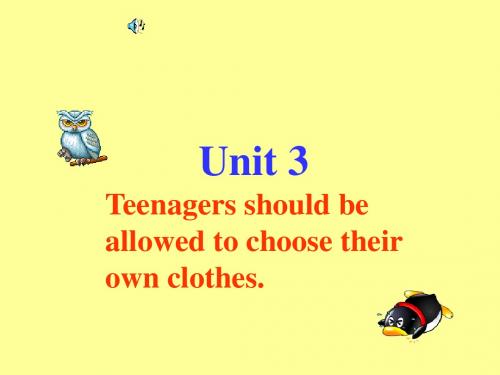
3. Students should not be allowed to go out at night.
4. Students should not be allowed to take part-time jobs .
3. Students should not be allowed to get their ears pierced.
一般现在时: am/is/ are +动词的过去分词 一般过去时: was/were +动词的过去分词
seem 似乎是,好象是 It seems/seemed that +从句 It seems that he is very lonely. He seems to be lonely. It seems that they are friends.
Tony didn’t , either.
neither did Tony.
He wasn’t a doctor , they were not ,either. neither were they.
Tim works hard, so he does. She is a doctor, so she is. He can play the guitar, so she can. So表示强调,主语确实如此。
My sister washed the clothes。 The clothes were washed by my sister. The teacher asked him to the office。 He was asked by the teacher to the office.
My parents allow me to watch TV. I am allowed to watch TV by my parents. He does his homework every day. His homework is done by him every day.
九年级Unit 3 Teenagers should be allowed to choose their own clothes.的语法知识点
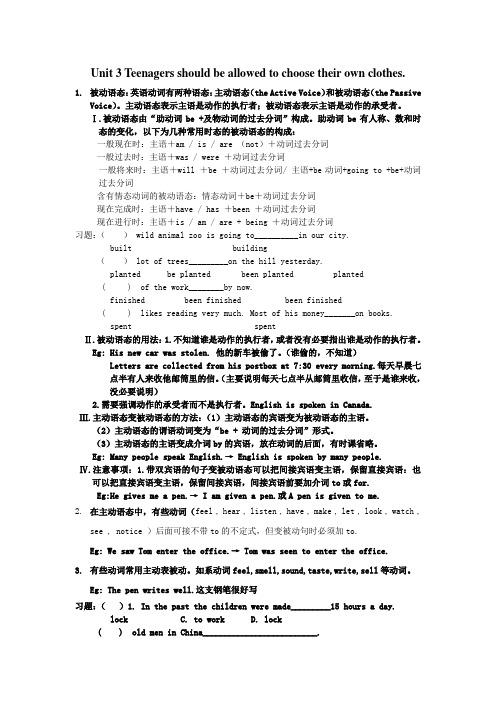
Unit 3 Teenagers should be allowed to choose their own clothes.1.被动语态:英语动词有两种语态:主动语态(the Active Voice)和被动语态(the PassiveVoice)。
主动语态表示主语是动作的执行者;被动语态表示主语是动作的承受者。
Ⅰ.被动语态由“助动词be +及物动词的过去分词”构成。
助动词be有人称、数和时态的变化,以下为几种常用时态的被动语态的构成:一般现在时:主语+am / is / are (not)+动词过去分词一般过去时:主语+was / were +动词过去分词一般将来时:主语+will +be +动词过去分词/ 主语+be动词+going to +be+动词过去分词含有情态动词的被动语态:情态动词+be+动词过去分词现在完成时:主语+have / has +been +动词过去分词现在进行时:主语+is / am / are + being +动词过去分词习题:() wild animal zoo is going to__________in our city.built building() lot of trees_________on the hill yesterday.planted be planted been planted planted( ) of the work________by now.finished been finished been finished( ) likes reading very much. Most of his money_______on books.spent spentⅡ.被动语态的用法:1.不知道谁是动作的执行者,或者没有必要指出谁是动作的执行者。
Eg: His new car was stolen. 他的新车被偷了。
(谁偷的,不知道)Letters are collected from his postbox at 7:30 every morning.每天早晨七点半有人来收他邮筒里的信。
九年级英语 Unit 3 Teenagers should be allowed to choose their own clothes. 讲解与练习

第 1 页 (共4 页) 第 2 页 (共4 页)学校 姓名 班级 考场 考号---------------------------------○密------------------ -------------------○封----------------------------- -- --○线----------------------------※※※※※※※※※※※※※※※答※※※※※※※※※※※※※※※※※※题※※※※※※※※※※※※※※※※线※※※※※※※※※※※※※九年级英语 Unit 3: Teenagers should be allowed tochoose their own clothes. 讲解与练习重点短语take the test 参加考试 pass the test 通过考试 fail a test 考试失败be strict with+人 对某人严格be strict in+事物 对某事要求严格stay up 熬夜have an opportunity to do sth.有机会做某事=have a chance to do/ of doing every other day 每隔一天 (每两天)clean up 打扫 整理learn from each other 互相学习concentrate on 专注于 one’s own 某人自己的the other day 前几天,几天前 = a few days ago= every two days at present 现在,目前 in this way 用这种方法in the way 挡道的,妨碍人的on the way 在路上 on one’s way to 在某人去…的路上 by the way 顺便说(问)be serious about 对…认真care for 在乎、关心 【语言点】1. Teenagers should be allowed to choose their own clothes.应该允许青少年选择自己的衣服。
unit3《teenagersshouldbeallowedtochoosetheirownclothes》教材全析(人教新目标初三)doc初中英语

[教材全析]友情提示SECTION ALanguage Goal:Talk about what you are allowed to do.Agree and disagree.语言目标:谈论你们被承诺做什么。
同意和不同意。
1a Read the statements below.Circle 〝A〞(for agree) or 〝D〞(for disagree).读下面的陈述。
圈出A(表示同意)或D(表示不同意)。
A D 1.I think teenagers①should be allowed to go out with their friends every night.我认为十几岁的青青年应当被承诺每晚同朋友们外出。
A D 2.Sixteen-year-olds should be allowed to drive.十六岁的青青年不应当被承诺驾车。
A D 3.Students should not be allowed to have part-time②job.学生们不可被承诺有兼职的工作。
A D 4.I don’t think twelve-year-olds should be allowed to get their ears pierced.我认为十二岁的青青年不应当被承诺打耳眼。
A D 5.I think twelve-year-olds③should be allowed to choose their own clothes.我认为十二岁的青青年应当被承诺选择自己的衣服。
含有助动词should的句子要变成被动语态,其方法是将主动语态中的宾语提到句首,然后在should后面跟被动语态的差不多结构be+v.过去分词。
将主语加上介词by放在句子末尾。
例题探究:Tom should be allowed to make friends with these teenagers by us.〔变成主动语态〕1b Listen and circle 〝T〞(for true) or 〝F〞(for false).听同时圈出T(对)或F(错)。
人教版英语九年级Unit 3同步阅读(含答案)
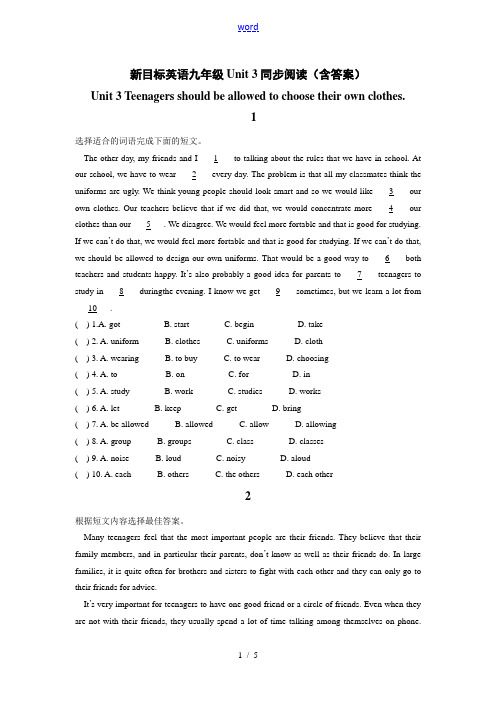
新目标英语九年级Unit 3同步阅读(含答案)Unit 3 Teenagers should be allowed to choose their own clothes.1选择适合的词语完成下面的短文。
The other day, my friends and I ___1___ to talking about the rules that we have in school. At our school, we have to wear ___2___ every day. The problem is that all my classmates think the uniforms are ugly. We think young people should look smart and so we would like ___3___ our own clothes. Our teachers believe that if we did that, we would concentrate more ___4___ our clothes than our ___5___. We disagree. We would feel more fortable and that is good for studying. If we can’t do that, we would feel more fortable and that is good for studying. If we can’t do that, we should be allowed to design our own uniforms. That would be a good way to ___6___ both teachers and students happy. It’s also probably a good idea for parents to ___7___ teenagers to study in ___8___ duringthe evening. I know we get ___9___ sometimes, but we learn a lot from ___10___.( ) 1.A. got B. start C. begin D. take( ) 2. A. uniform B. clothes C. uniforms D. cloth( ) 3. A. wearing B. to buy C. to wear D. choosing( ) 4. A. to B. on C. for D. in( ) 5. A. study B. work C. studies D. works( ) 6. A. let B. keep C. get D. bring( ) 7. A. be allowed B. allowed C. allow D. allowing( ) 8. A. group B. groups C. class D. classes( ) 9. A. noise B. loud C. noisy D. aloud( ) 10. A. each B. others C. the others D. each other2根据短文内容选择最佳答案。
- 1、下载文档前请自行甄别文档内容的完整性,平台不提供额外的编辑、内容补充、找答案等附加服务。
- 2、"仅部分预览"的文档,不可在线预览部分如存在完整性等问题,可反馈申请退款(可完整预览的文档不适用该条件!)。
- 3、如文档侵犯您的权益,请联系客服反馈,我们会尽快为您处理(人工客服工作时间:9:00-18:30)。
A: Do you ever get to class late ? B1: Yes, I sometimes get to class late . Because I sleep late sometimes . B2: No, I never get to class late . I always get to class on time . study with friends? finish a test early? worry that you’ll fail a test? …
填空(完成被动语态填空) 1. They often clean their classroom after school . (改为被动语态) Their classroom _____ often ______ by them after school. 2. Li Lei gave Tom a new pen last week . (同上) A new pen _____ _______ _____ Tom last week . 3. A lot of people in China can speak English now . (同上) English ______ ____ ______ by a lot of people in China now. 4. I have learned English for about two years. (同上) English ______ ______ ______ for about two years. 5. They will publish these story-books next month. (同上) These story-books _____ _____ _____ next month.
1. is cleaned 3. Can be spoken 5. will be published
2. was given by 4. has been learned
Homework
Write rules for your English class.
4.He could ____________. pass the test
take the test later 5.He should be allowed to ________________.
f a
Do you agree the following statements? Discuss them with yourrcle the things in 1a that you hear.
Do you ever…
1.get to class late? 2.study with friends? 3.finish a test early? 4.worry that you’ll fail a test?
Listen again. Then fill in the blanks.
a math test 1.Peter is going to fail _______________.
2.He isn’t allowed to _______________. get to class late take the test 3.Peter wasn’t allowed to ____________.
Unit 3 Teenagers should be
allowed to choose their own clothes. Section B (1a-2c)
Read the questions. How often do you do these things? Write “A” (for always), “U” (for usually), “S” (for sometimes) and “N” (for never).
1.Peter should be allowed to take the test later. 2.Students need strict rules. 3.Parents should not be too strict with teenagers.
A:I think Peter should be allowed to take the test later. B:I agree with you./I don’t agree with you.
Do you ever…
1.get to class late ? 2.study with friends? 3.finish a test early? 4.worry that you’ll fail a test? ________ ________ ________ ________
Ask and answer in pairs.
